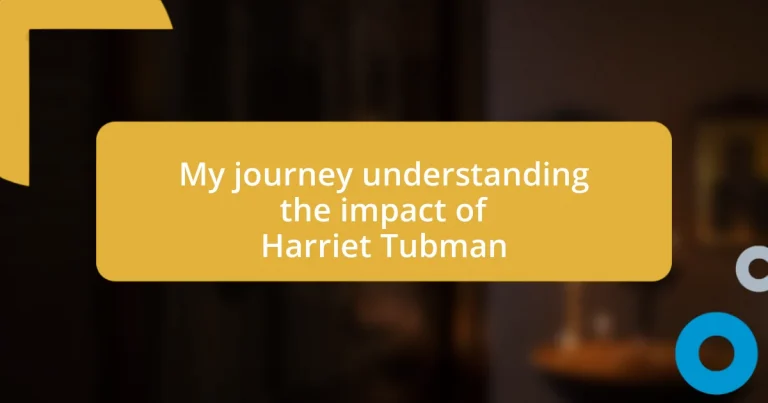Key takeaways:
- Harriet Tubman’s escape from slavery in 1849 marked the beginning of her remarkable journey as a leader in the fight for freedom.
- As a conductor of the Underground Railroad, Tubman helped over 70 enslaved individuals escape, using her strategic networking skills to coordinate safe passages.
- Tubman’s advocacy for women’s rights and her courageous legacy continue to inspire modern social justice movements, emphasizing the importance of collective action and community support.

Exploring Tubman’s historical context
To truly appreciate Harriet Tubman’s impact, we must place her within the turbulent backdrop of 19th-century America, a time when slavery was not just a personal tragedy, but a national institution. Imagine living in a society where human beings were treated as property—how would that shape your understanding of freedom? This was the reality many faced, fueling Tubman’s fierce resolve to challenge such injustices.
During her lifetime, the tension between North and South escalated, setting the stage for the Civil War. The Fugitive Slave Act of 1850 heightened the stakes, making it incredibly perilous for escapees. I can’t help but admire Tubman’s courage in traversing this dangerous landscape. Her efforts didn’t just free individuals; they sparked a broader movement that questioned the very moral foundation of the nation.
As I reflect on her journey, I feel a deep connection to the audacity she displayed. Tubman was not just a woman on a mission; she was a beacon of hope for countless others. What drives someone to risk everything for the sake of others? Tubman’s unwavering commitment encourages me to think about the importance of standing up against oppression in any form, encouraging us all to consider how we might also contribute to the fight for justice today.

Key events in Tubman’s life
Harriet Tubman’s life is a tapestry woven with pivotal events that defined her role in history. One of the most significant moments was her own escape from slavery in 1849. I often think about the blend of fear and hope she must have felt during that harrowing journey—leaving behind everything she knew for the promise of freedom. This single act of courage set her on a path to becoming the leader we remember today.
- Escape from slavery (1849): Tubman fled from the Eastern Shore of Maryland, navigating treacherous terrain to reach Pennsylvania.
- Underground Railroad (1850s): After her escape, she became a conductor, helping over 70 enslaved individuals to freedom.
- Civil War service (1861-1865): Tubman served as a nurse, cook, and spy for the Union Army, showcasing her multifaceted talents.
- Women’s suffrage movement (1860s-1900): She became an advocate for women’s rights, continuing her fight for justice beyond slavery.
As I explore these key moments, I feel a profound respect for her relentless spirit. Each chapter of her life illustrates not just her courage but also her commitment to the fight for freedom. It makes me wonder about the impact of individual choices throughout history—how one person’s decision can ignite hope and inspire change in so many others. Tubman’s journey is a powerful reminder that history is shaped by those daring enough to rewrite its narrative.

Impact on the Underground Railroad
Certainly! Here’s the text centered on Harriet Tubman’s impact on the Underground Railroad, along with the requested HTML table format:
The contributions of Harriet Tubman to the Underground Railroad are nothing short of extraordinary. As a conductor, she risked her life over and over again, navigating through hostile territory. I often think about the bond she must have forged with those she led to freedom, a shared determination driving them forward, embodying the spirit of resilience.
What stands out in my mind is Tubman’s remarkable ability to strategize routes and gather support. Imagine the sheer will it took to organize safe houses and coordinate efforts with other abolitionists. This wasn’t just a series of journeys; it was a movement, one that not only liberated individuals but also fueled a growing national conversation about slavery.
Reflecting on her bravery, I can’t help but feel a deep admiration for the trust she cultivated among those escaping enslavement. Picture the courage required to navigate toward the unknown with just a glimmer of hope. Tubman’s legacy along the Underground Railroad underscores how one individual, armed with determination and empathy, can ignite transformative change and inspire future generations to stand for justice.
| Factor | Details |
|---|---|
| Role as Conductor | Helped an estimated 70 enslaved individuals reach freedom. |
| Strategic Networking | Established connections with abolitionists to ensure safe passages. |

Modern relevance of Tubman’s story
Understanding the modern relevance of Harriet Tubman’s story is like peeling back layers of an onion—each layer reveals profound lessons that resonate today. Tubman’s courage in the face of oppression inspires contemporary social justice movements. I often find myself reflecting on her tenacity when I see activists today marching for equality. Isn’t it fascinating how her legacy fuels the fire of determination in those advocating for their rights now?
Her commitment to freedom and equality serves as a timeless reminder that the fight against injustice is ongoing. I can’t help but question how her experiences inform our struggle against systemic racism today. For me, it’s a call to action; Tubman’s life exemplifies that true change requires not just belief, but steadfast action, a sentiment that continues to ring true in our current climate.
Moreover, Tubman’s dedication to women’s rights lays a critical foundation for modern feminist movements. I often connect her fight with the challenges women face today—both in terms of equal rights and representation. Isn’t it powerful to think about how her story encourages women everywhere to rise, push boundaries, and claim their rightful place in society? Her journey is a stark reminder that the past influences our present and future, urging us to honor her legacy by continuing the work she started.

Applying Tubman’s lessons today
Applying Tubman’s lessons today can feel incredibly relevant, especially in the current social landscape. When I see people advocating for change, I often recall Tubman’s unwavering spirit and commitment. Isn’t it remarkable how her determination to seek freedom mirrors the passion of those fighting for equality today? Each protest feels like a modern-day journey on the Underground Railroad, where individuals come together, fueled by a shared vision for a more just society.
I admire how Tubman operated with both courage and strategy. It reminds me of how important it is to build connections and create alliances, even in everyday life. There’s something empowering about gathering a community around a common purpose, don’t you think? When we channel her lessons, we realize that the movement toward justice requires collaboration and support at every level, fostering bonds like those formed along the routes she blazed.
Reflecting on her advocacy for both freedom and women’s rights, I’m struck by how Tubman’s journey encourages us to address intersecting issues today. Her life challenges me to consider how my voice can contribute meaningfully to not just one cause, but many. In our fast-paced world, are we taking the time to amplify voices that need support? The answers may lie in the legacy she left behind, urging us to rise and advocate for equitable treatment for all.














